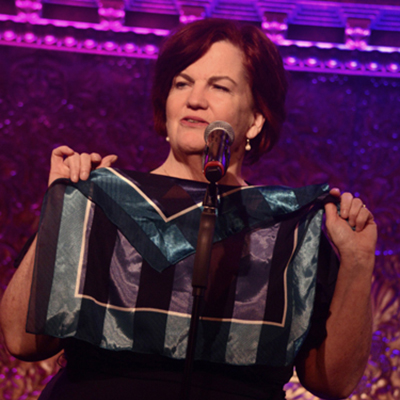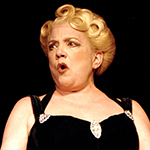To Life: A Celebration of Sheldon Harnick’s Legacy on His 100th
54 Below, NYC, April 30, 2024
Reviewed by Alix Cohen

Photo: Robert Armin
“Welcome to Sheldon’s 100th Birthday Party” began host Deborah Grace Winer at 54 Below. At the celebration for his 99th, the lively, then still-working lyricist said, “Let’s do this again next year.” (He died on June 23, 2023.) Winer has been a family friend since she was very young. Toasting Margie Harnick (Sheldon’s wife) and her son Matt at the back of the club, she reminded the packed house how beloved the pair were in the theater community.

Photo: Maryann Lopinto
Allison Blackwell opened with “Gorgeous” (The Apple Tree; music by Jerry Bock). Possibly in an attempt to be funny, she was loud and angry, which did neither herself nor the song any service. Kate Baldwin followed with “When Did I Fall in Love?” (Fiorello; Bock). It was a beautiful rendition of a beautiful song. I recall her Feinstein’s at the Regency show with Harnick as a guest. (No one performed his material like he did.) Their mutual affection was clear. Austin Pendleton, who created the role of Motel the tailor in the original 1964 production of Fiddler on the Roof, told us how the song “Miracle of Miracles” was added after the show was already on its feet. If pianist Greg Kenna had chosen a slower temp, Pendleton might have had less trouble with the lyrics and space enough to act.

Photo: Maryann Lopinto
Winer said “Sheldon was a very urbane, Midwestern (Chicago) man. He wrote light verse and played violin growing up and sketches and songs while he was in the army. He was an incredible wordsmith, but also an incredible dramatist, writing for character, furthering plot.” Also from Fiorello, we heard Rebecca Spigelman sing “I Love a Cop.” She has a marvelous vocal instrument, but her performance was so self-conscious that the sentiment was not credible.
In the early 1960s, Harnick wrote The Body Beautiful with his new collaborator Jerry Bock. It ran for only 60 performances, but its score came to the attention of George Abbott and Hal Prince, who hired the young men to write Fiorello. As a ten-year-old Edmund Gaynes was cast in that production, “and it was my third show,” the now grown-up vocalist added. “I heard about the famous composer Bach and here he was, alive,” he quipped. Throat issues prevented Gaynes from singing, so he recited part of “Every Man for Himself.”
Winer told us that Harnick and John Kander had come up the ranks together and were great friends. Kander told Winer that their peers were all jealous of Harnick for being successful with revue songs that were often picked up for night-clubs shows or recordings. Mary Stout sang “Garbage” (music and lyric by Harnick) from The Shoestring Revue. Typically, Harnick peppered his song with double entendres: “threw me out,” “disposal,” “collected.” “If I am the garbage/Take me away” Stout sang as she doffed her hat to reveal a fried egg. This apt characterization revealed a broad who has had enough.
Adam Kantor played multiple roles in Fiddler while growing up in Great Neck, Long Island and was cast as Motel for Broadway’s 2015 recent revival of Fiddler. “The Richest Man in Town” was one of many songs cut when Jerome Robbins took over as director of the original production. Kantor’s performance was sweet, surprised, and grateful. In an iconic evening at the 92nd Street Y found Harnick regaled the audience with songs he had relegated to his trunk, many from Fiddler. “It’s clear this was penned by a human,” Kantor commented. “It really seems to come from the heavens.”
“At 99, lying in a hospital bed for something minor, he said, ‘Debbie you have to get them to let me go home. I have work to do!’ Winer recalled. Liz Larsen and Pendleton portrayed Goldie and Tevye in “Do You Love Me?,” one of Harnick’s favorite songs and one he and Margie often performed at parties. The usually reliable Larsen was shrill, and her accent was exaggerated. Pendleton was quiet and humble.
“Margie and Sheldon were like teenagers in love.” Winer said. “She was in both Tenderloin and Fiddler.” From the former, Mark William gave us “Artificial Flowers” (lyric by Bock), not as it would be performed in the show, but as Bobby Darin rendered it in his version that made the pop charts. It was an odd decision under the circumstances; it sounded like a swinging Edward Gorey.
Neva Small, who was Chava in the film version of Fiddler, shared the stirring, also cut, “When the Messiah Comes.” “This shows the side of Sheldon as history teacher,” she noted, “He will say, I apologize I took so long/But I had a little trouble finding you/Over here a few and over there a few/You were hard to reunite, but/Everything is going to be all right.”
“Boston Beguine” (music and lyric by Harnick from New Faces of 1952), was a push back to the city’s banning all materials on sex education. Replete with the New England “AH” sound, Mary Callanan gave it her all. “The strings of my heart seem to be knotted/And even the plants seem to be potted.”

Photo: Maryann Lopinto
Longtime Harnick pal Jim Brochu shared a sweet story about Harnick’s generosity and showed a video clip from his own birthday party where the two men charmingly duetted on “Do I Love You?” “I saw Fiddler the second night in seat A105. Zero Mostel was 10 feet away from me. I’d come from Carnegie Tech with my friend Stephen Schwartz (‘don’t know what happened to him’).” His interpretation of “If I Were a Rich Man” exhibited minimum movement and maximum heart. (Brochu would later write and perform a one-man show about Mostel called Zero Hour.)

Photo: Maryann Lopinto
The show closed with “In My Own Lifetime” sung by Robert Cuccioli, who inhabited the role of Mayer in York Theater’s production of The Rothschilds. “It’s amazing how relevant a song can be,” he said, speaking for all of us: “In my own lifetime/I want to see the fighting cease…While I’m still here, I want to know/Beyond a doubt/That no one can lock us in/Or lock us out.” Amen.
Tonight’s selections were a curious mix that left out iconic shows and included some lesser numbers from revues. It would have been illuminating and fun to hear more personal anecdotes from Winer but love and admiration shined through everything she said. Sheldon Harnick was an extraordinary writer and a good and generous man; one quality fed the other. His work will live on as an example.





